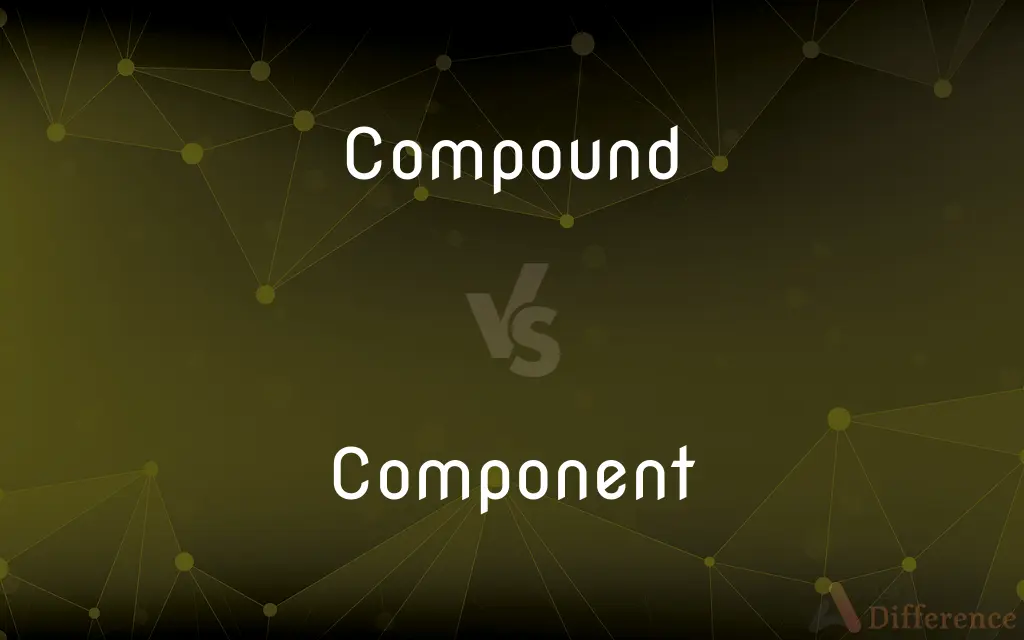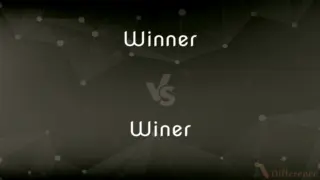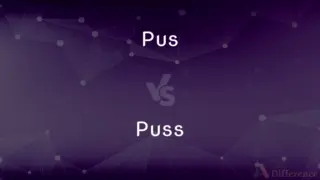Compound vs. Component — What's the Difference?
Edited by Tayyaba Rehman — By Fiza Rafique — Updated on March 18, 2024
A compound is a substance formed by chemically bonding two or more elements, while a component is a part or element of a larger whole.

Difference Between Compound and Component
Table of Contents
ADVERTISEMENT
Key Differences
A compound is a chemical substance formed when two or more elements combine in a fixed ratio and undergo a chemical reaction, resulting in a substance with properties different from those of the individual elements. Compounds, such as water (H2O), have unique chemical structures and properties. On the other hand, a component is a more general term that refers to any individual part of a larger system, assembly, or mixture. Components can be of any nature - mechanical, electrical, or even ingredients in a recipe - and are not limited to chemical compounds.
Compounds are characterized by having a definite composition and structure, which dictates their specific chemical and physical properties. For instance, the compound carbon dioxide (CO2) consists of carbon and oxygen in a fixed ratio, which determines its unique characteristics, such as being a gas at room temperature. Components, in contrast, can vary widely in their nature and function. In a computer, for example, components like the CPU, memory, and hard drive contribute to the system’s overall functionality, but each retains its own properties and can be analyzed independently.
Chemical bonding is fundamental to the formation of compounds, where atoms share or transfer electrons to achieve stable electron configurations. This bonding results in the creation of molecules with new properties. Components, however, might not necessarily be bonded in a chemical sense but are assembled or mixed together to form a functional unit or system, like the ingredients in a salad.
The study and categorization of compounds fall within the realm of chemistry, particularly in fields like organic, inorganic, and physical chemistry, each focusing on different types of compounds and their reactions. The concept of components is more ubiquitous and is relevant in various fields such as engineering, architecture, and information technology, highlighting its broader applicability.
Compounds and components also differ in their method of separation. Compounds can be broken down into their constituent elements or simpler compounds only through chemical reactions, such as electrolysis. Components of a mixture, like sand and iron filings, can often be separated through physical means, such as magnetism or filtration, without altering the inherent properties of the components.
ADVERTISEMENT
Comparison Chart
Definition
A substance formed by the chemical combination of two or more elements in a fixed ratio.
An individual part or element of a larger whole, system, or assembly.
Nature
Chemical, with new properties differing from its constituent elements.
Can be of any nature (mechanical, electrical, etc.), does not necessarily possess new properties.
Formation
Through chemical reactions, involving the sharing or transfer of electrons.
Can be assembled, mixed, or combined without specific chemical reactions.
Field of Study
Chemistry (organic, inorganic, physical chemistry).
Various fields (engineering, architecture, IT).
Separation
Requires chemical reactions (e.g., electrolysis).
Often achievable through physical means (e.g., magnetism, filtration).
Compare with Definitions
Compound
A chemical substance with a specific chemical formula.
Table salt (NaCl) is a compound formed from sodium and chlorine.
Component
An individual part of a system or assembly.
A processor is a key component of a computer.
Compound
A substance where atoms are bonded in a specific arrangement.
Water's (H2O) unique properties are due to its molecular structure.
Component
Does not undergo chemical bonding with other components.
The wheels of a car are attached but not chemically bonded.
Compound
Formed through chemical reactions.
Carbon dioxide (CO2) is produced when carbon combusts in oxygen.
Component
Can be physical or abstract in nature.
User interface elements are components of software design.
Compound
Has properties different from its constituent elements.
Sodium chloride is edible and safe, unlike its reactive components sodium and chlorine.
Component
Can be separated by physical means.
Nuts and bolts can be unscrewed and removed from an assembly.
Compound
Identified by chemical formulas.
Glucose is denoted as C6H12O6, representing its composition.
Component
Retains its individual properties within the system.
Sugar remains sweet whether alone or as part of a cake.
Compound
To combine so as to form a whole; mix
Tin was often compounded with lead to make pewter.
Component
A part or element of a larger whole, especially a part of a machine or vehicle
Hydrogen is a component of all organic compounds
An assembly plant for imported components
Compound
To produce or create by combining two or more ingredients or parts; compose or make up
Pharmacists compounding prescriptions.
Component
Constituting part of a larger whole; constituent
The component elements of the armed forces
Compound
To settle (a debt, for example) by agreeing on an amount less than the claim; adjust.
Component
A constituent element, as of a system.
Compound
To compute (interest) on the principal and accrued interest.
Component
A part of a mechanical or electrical complex.
Compound
To add to or intensify so as to make worse
"The university authorities ... compounded their crime in dismissing [the professor] by denying that their action ... reflected any abridgment of academic freedom" (John Kenneth Galbraith).
Component
(Mathematics) One of a set of two or more vectors having a sum equal to a given vector.
Compound
To make worse by being an additional or intensifying factor
High winds compounded the difficulties of the firefighters.
Component
Being or functioning as a constituent or an ingredient.
Compound
To combine in or form a compound.
Component
A smaller, self-contained part of a larger entity. Often refers to a manufactured object that is part of a larger device.
A CPU is a component of a computer.
Compound
To come to terms; agree.
Component
Making up a larger whole; as a component word.
Compound
Consisting of two or more substances, ingredients, elements, or parts.
Component
Made up of smaller complete units in combination; as a component stereo.
Compound
(Botany) Composed of more than one part
A compound pistil.
Component
Serving, or helping, to form; composing; constituting; constituent.
The component parts of natural bodies.
Compound
A combination of two or more elements or parts.
Component
A constituent part; an ingredient.
Compound
(Linguistics) A word that consists either of two or more elements that are independent words, such as loudspeaker, self-portrait, or high school, or of specially modified combining forms of words, such as Greek philosophia, from philo-, "loving," and sophia, "wisdom."
Component
An abstract part of something;
Jealousy was a component of his character
Two constituents of a musical composition are melody and harmony
The grammatical elements of a sentence
A key factor in her success
Humor: an effective ingredient of a speech
Compound
(Chemistry) A pure, macroscopically homogeneous substance consisting of atoms or ions of two or more different elements in definite proportions that cannot be separated by physical means. A compound usually has properties unlike those of its constituent elements.
Component
Something determined in relation to something that includes it;
He wanted to feel a part of something bigger than himself
I read a portion of the manuscript
The smaller component is hard to reach
Compound
A building or buildings, especially a residence or group of residences, set off and enclosed by a barrier.
Component
An artifact that is one of the individual parts of which a composite entity is made up; especially a part that can be separated from or attached to a system;
Spare components for cars
A component or constituent element of a system
Compound
An enclosed area used for confining prisoners of war.
Compound
An enclosure within which workers, prisoners, or soldiers are confined.
Compound
An enclosure for secure storage.
Compound
A group of buildings situated close together, e.g. for a school or block of offices.
Compound
Anything made by combining several things.
Compound
(chemistry) A substance formed by chemical bonding of two or more elements in definite proportions by weight.
Compound
A substance made from any combination of ingredients.
Compound
(linguistics) A lexeme that consists of more than one stem.
Compound
(linguistics) A lexeme that consists of more than one stem or an affix, e.g. bookshop, high school or non-standard.
Compound
(rail) A compound locomotive, a steam locomotive with both high-pressure and low-pressure cylinders.
Compound
Composed of elements; not simple.
A compound word
Compound
(math) Dealing with numbers of various denominations of quantity, or with processes more complex than the simple process.
Compound addition
Compound proportion
Compound
(music) An octave higher than originally (i.e. a compound major second is equivalent to a major ninth).
Compound
(transitive) To form (a resulting mixture) by combining different elements, ingredients, or parts; to mingle with something else.
To compound a medicine
Compound
To settle by agreeing on less than the claim, or on different terms than those stipulated.
To compound a debt
Compound
(transitive) To settle amicably; to adjust by agreement.
Compound
(intransitive) To come to terms of agreement; to settle by a compromise.
To compound with someone / for something
Compound
To compose; to constitute.
Compound
To increase in value with interest, where the interest is earned on both the principal sum and prior earned interest.
Compound
To worsen a situation.
Compound
Of a horse: to fail to maintain speed.
Compound
In the East Indies, an inclosure containing a house, outbuildings, etc.
Compound
That which is compounded or formed by the union or mixture of elements ingredients, or parts; a combination of simples; a compound word; the result of composition.
Rare compound of oddity, frolic, and fun.
When the word "bishopric" was first made, it was made as a compound.
Compound
A union of two or more ingredients in definite proportions by weight, so combined as to form a distinct substance; as, water is a compound of oxygen and hydrogen.
Compound
To form or make by combining different elements, ingredients, or parts; as, to compound a medicine.
Incapacitating him from successfully compounding a tale of this sort.
Compound
To put together, as elements, ingredients, or parts, in order to form a whole; to combine, mix, or unite.
We have the power of altering and compounding those images into all the varieties of picture.
Compound
To modify or change by combination with some other thing or part; to mingle with something else.
Only compound me with forgotten dust.
Compound
To compose; to constitute.
His pomp and all what state compounds.
Compound
To settle amicably; to adjust by agreement; to compromise; to discharge from obligation upon terms different from those which were stipulated; as, to compound a debt.
I pray, my lords, let me compound this strife.
Compound
To effect a composition; to come to terms of agreement; to agree; to settle by a compromise; - usually followed by with before the person participating, and for before the thing compounded or the consideration.
Here's a fellow will help you to-morrow; . . . compound with him by the year.
They were at last glad to compound for his bare commitment to the Tower.
Cornwall compounded to furnish ten oxen after Michaelmas for thirty pounds.
Compound for sins they are inclined toBy damning those they have no mind to.
Compound
Composed of two or more elements, ingredients, parts; produced by the union of several ingredients, parts, or things; composite; as, a compound word.
Compound substances are made up of two or more simple substances.
Compound
(chemistry) a substance formed by chemical union of two or more elements or ingredients in definite proportion by weight
Compound
A whole formed by a union of two or more elements or parts
Compound
An enclosure of residences and other building (especially in the Orient)
Compound
Make more intense, stronger, or more marked;
The efforts were intensified
Her rudeness intensified his dislike for her
Potsmokers claim it heightens their awareness
This event only deepened my convictions
Compound
Put or add together;
Combine resources
Compound
Calculate principal and interest
Compound
Create by mixing or combining
Compound
Combine so as to form a whole; mix;
Compound the ingredients
Compound
Of leaf shapes; of leaves composed of several similar parts or lobes
Compound
Consisting of two or more substances or ingredients or elements or parts;
Soap is a compound substance
Housetop is a compound word
A blackberry is a compound fruit
Compound
Composed of many distinct individuals united to form a whole or colony;
Coral is a colonial organism
Common Curiosities
What is an example of a compound?
Water (H2O) is a common example, formed from hydrogen and oxygen.
How do the properties of compounds compare to their constituent elements?
Compounds possess unique properties that are often markedly different from those of their constituent elements.
Are all components physical objects?
No, components can be both physical objects and abstract elements, like software modules.
What defines a compound?
A compound is defined by its specific chemical formula and the chemical bonding of its constituent elements.
What is an example of a component?
In a computer, an example would be the hard drive, serving as a storage component.
Are the terms "compound" and "component" interchangeable?
No, they refer to distinct concepts in chemistry and systems theory, respectively.
Can compounds be separated into their elements easily?
Compounds require chemical reactions for separation, which can be complex and energy-intensive.
Can a component be a compound?
Yes, a compound can be considered a component of a larger system when it forms part of a mixture or solution.
What role do compounds play in biology?
Compounds, such as water and carbohydrates, are crucial for various biological processes and structures.
How do engineers use the concept of components?
Engineers design systems by combining various components, each fulfilling a specific function within the system.
Can a mixture be considered a compound?
No, mixtures consist of components mixed together without chemical bonding, retaining their individual properties.
How are new compounds created?
New compounds are created through chemical reactions that involve rearranging atoms and forming new bonds.
Is air a compound or a component?
Air is a mixture of components, including various gases like nitrogen and oxygen, not chemically bonded.
How are components identified in a system?
Components are identified based on their role, function, and the properties they contribute to the system.
Can a component exist independently of a system?
Yes, components can often exist independently and retain their properties outside of the system they are part of.
Share Your Discovery

Previous Comparison
Winner vs. Winer
Next Comparison
Pus vs. PussAuthor Spotlight
Written by
Fiza RafiqueFiza Rafique is a skilled content writer at AskDifference.com, where she meticulously refines and enhances written pieces. Drawing from her vast editorial expertise, Fiza ensures clarity, accuracy, and precision in every article. Passionate about language, she continually seeks to elevate the quality of content for readers worldwide.
Edited by
Tayyaba RehmanTayyaba Rehman is a distinguished writer, currently serving as a primary contributor to askdifference.com. As a researcher in semantics and etymology, Tayyaba's passion for the complexity of languages and their distinctions has found a perfect home on the platform. Tayyaba delves into the intricacies of language, distinguishing between commonly confused words and phrases, thereby providing clarity for readers worldwide.
















































